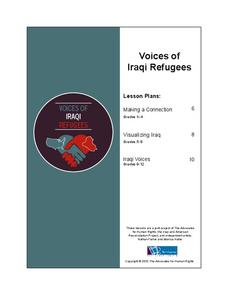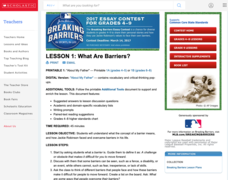Curated OER
Examining What Sharing Really Means
Learners read "The Senegalese Miracle". They discuss the amount of sharing the author finds in Africa. They examine the relationship the author has to the locals.
iCivics
So You Think You Can Argue
What defines an argument, and how can someone properly formulate a counterargument? This resource provides two options—an interactive PowerPoint presentation or worksheet—that will support your learners as they begin to explore how to...
Overcoming Obstacles
Clarifying Values
Encourage thoughtful decision making with a lesson that highlights the importance of values. Scholars take part in a grand conversation, listen to stories, and make decisions based on their personal values.
Curated OER
What is an Atlatl?
Let's go an an archaeological dig! Prepare your kids with a list of vocabulary terms relating to archaeology, including different types of items that one might find. They study pictures of each item and play a memory game based on the...
iCivics
The Fourth Branch: You!
Take time to remind your young learners of the valuable understanding that each branch of the United States government is really composed of other citizens. The reading material and worksheets of this resource cover the importance of...
iCivics
Government Spending
After discussing personal financing with your class, consider following up with this well-rounded introduction to government spending. The resource includes reading documents and worksheets, and covers topics as the federal deficit and...
National Endowment for the Humanities
Albert Sabin and Bioethics: Testing at the Chillicothe Federal Reformatory
Do the ends justify the means? Getting a drug approved in the US is a long and involved process. But at some point out, it involves testing on humans. The ethics of such testing is the focus of a resource that uses Dr. Albert Sabin's...
University of the Desert
Tackling Extremism
Given examples of modern terrorist attacks, learners discuss the characteristics of violent extremists and what measures are currently being taken to prevent attacks by such groups.
University of the Desert
What Is Extremism?
By participating in discussions using prompts and statements provided in the instructional activity plan, learners identify the concept of extremism and consider what causes violent acts of extremism in the modern world.
University of the Desert
How Do I Feel That My Culture Is Misunderstood by Others?
Using video clips of young adults from around the world describing their cultures and how they can be misunderstood, learners compare their own cultural point of view to that of others through discussion and writing.
Museum of Tolerance
Just What Kind of American Are You?
Your parents were both in different countries. You were born in the US. Documents and application forms ask you to identify your racial or ethnic classification. Which box do you check? Class members collect documents and application...
Peace Corps
Introducing Culture
Growing up within a culture leaves a lot of ideas and values unspoken. Take a closer look at the cultures in which your learners live with a discussion activity that addresses cultural identity and traits of those living within the...
Peace Corps
Defining Culture
How has culture shaped you? Middle and high schoolers examine different aspects of one's culture, including religious beliefs, social customs, and family traditions, and discuss the ways that their personalities have been formed by these...
Advocates for Human Rights
Voices of Iraqi Refugees
The stated goal of this resource is to provide learners with basic facts about and build empathy for Iraqi refugees. To do so elementary classes develop a plan for how to welcome refugees to their classroom. Middle schoolers read...
Carolina K-12
How Do I Pre-Register and Vote in North Carolina?
This practical activity helps young citizens learn about pre-registration to vote in elections, discuss the merits and flaws of the pre-registration process, and register themselves. The concluding activity has young voters creating an...
US Institute of Peace
Responding to Conflict: Negotiation Role-Play
After a lesson like this one, your class won't hesitate to negotiate! Pupils pair up and negotiate opposing sides of a conflict during the ninth installment in a 15-part series. Once they determine their wants and needs, individuals...
US Institute of Peace
Maintaining Trusting Relationships
What role does trust play in diffusing a tense situation? Young social scientists explore trust on a personal and global level during a lesson on peace and conflict. After participating in a trust sit, participants work in groups to...
US Institute of Peace
The Process of Negotiation
What does it take to be a great negotiator? Learners discover the factors that affect the negotiation process through group discussion and brainstorming. An installment in a series of peacebuilding activities compares the needs and wants...
US Institute of Peace
Identifying Conflicts
When viewpoints collide, conflict arises. Can your pupils identify the components of conflict? The fourth in a series of 15 lessons about peacebuilding helps participants identify the underlying causes of conflict. Teams role play to...
US Institute of Peace
Becoming a Peacebuilder
"Be the change you wish to see in the world!" The 15th and final lesson in a peacebuilding series uses this quote from Gandhi to prepare pupils for their own action projects. Individuals research a global issue, then brainstorm a method...
PBS
Family History: Treasure Troves
It's time for show and tell! Scholars investigate historical artifacts to determine what secrets they reveal about the time periods they represent. They then research their own personal artifacts, as well as those from World War I.
Scholastic
Lesson 1: What Are Barriers?
Scholars discuss the concept of a barrier with a short passage on Jackie Robinson. The writing process begins with a paragraph and several other sentences about Robinson's unique traits that made breaking a barrier possible.
The New York Times
Where to Draw the Line: Balancing Government Surveillance with the Fourth Amendment
The question of how to balance Fourth Amendment Rights with national security concerns becomes critical in an age of planned terrorist attacks, election interference, and fake news. Get young social scientists involved in the debate with...
C-SPAN
Middle School Checks and Balances
Seven video clips reveal how the checks and balances built into the constitutional framework of the United states' government are designed to keep any one branch from becoming too powerful. After watching each clip, groups identify the...
Other popular searches
- Environment Volunteering
- Volunteering Italy
- Volunteering and Giving
- Kids Volunteering
- Volunteering Lesson Plans
- Economics Volunteering
- Volunteering Worksheets
- Volunteering for War
- Volunteering for a Job
- Volunteering Third Grade
- Volunteering in the Community

























